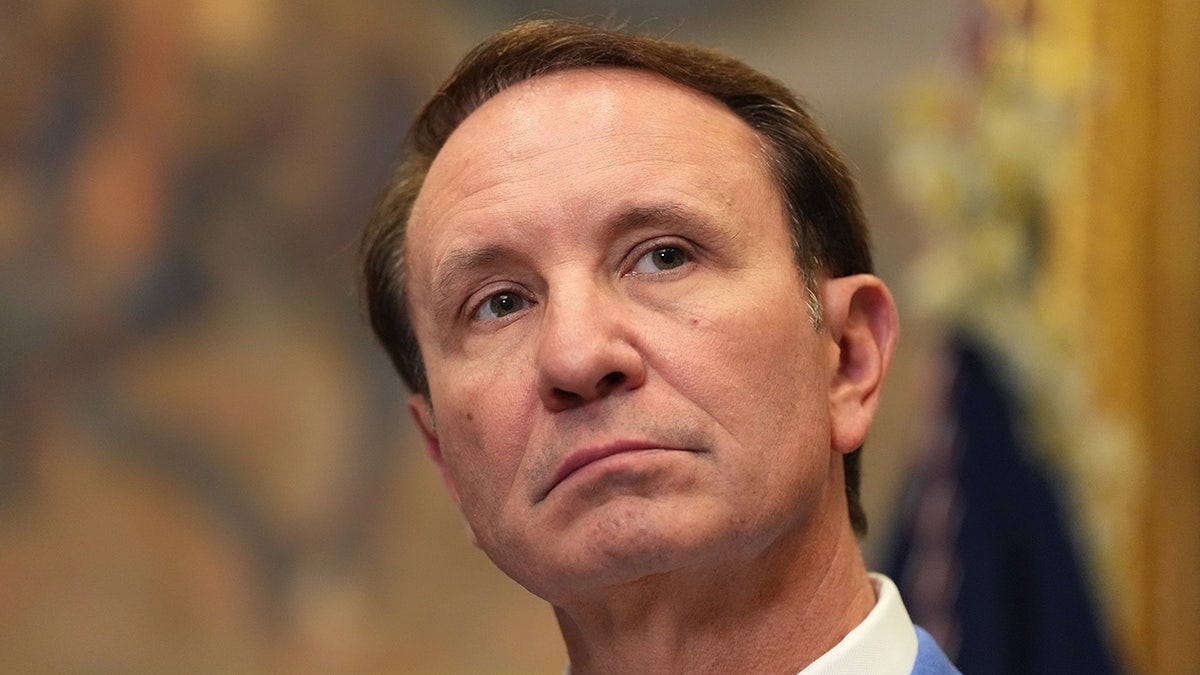
‘The money does not exist’: Why the buyouts for college football coaches are setting off alarm bells
Entities mentioned:
- Jeff Landry: Righteousness, Moral outrage, Justice
- Scott Woodward: Self-preservation, Power, Control
- Brian Kelly: Ambition, Competitive spirit, Recognition
- College Football Programs: Competitive spirit, Ambition, Pride
Article Assessment:
Credibility Score: 85/100
Bias Rating: 55/100 (Center)
Sentiment Score: 30/100
Authoritarianism Risk: 25/100 (Generally Democratic)
Bias Analysis:
The article presents a balanced view, quoting various sources and providing context. While critical of excessive spending, it offers multiple perspectives without favoring a particular side.
Key metric: College Football Program Financial Sustainability
Let me tell you something - this story is RIDICULOUS! We're seeing a full-court press against the big spending in college football, folks! Governor Landry is coming in like a blitzing linebacker, sacking the LSU athletic department's game plan. The buyout frenzy has turned into a high-stakes poker game, with schools going all-in on coaches without the chips to back it up. It's fourth and long for many programs, and they're still calling for a Hail Mary pass with these massive contracts. I'm telling you right now, this financial playbook is leading to a fumble of epic proportions. The clock is ticking, and these athletic departments need to find a way to get back in the black before the final whistle blows on their fiscal sanity!

LSU's New Interim AD Says School's Athletic Department 'Is Not Broken'
Entities mentioned:
- Verge Ausberry: Determination, Loyalty, Professional pride
- Scott Woodward: Self-preservation, Professional pride, Legacy
- Kim Mulkey: Loyalty, Competitive spirit, Determination
- Brian Kelly: Competitive spirit, Ambition, Self-preservation
- Gov. Jeff Landry: Control, Power, Influence
- LSU Board of Supervisors: Control, Power, Influence
Article Assessment:
Credibility Score: 75/100
Bias Rating: 45/100 (Center)
Sentiment Score: 35/100
Authoritarianism Risk: 40/100 (Generally Democratic)
Bias Analysis:
The article presents multiple perspectives, including those of the interim AD, board members, and coaches. It balances positive statements about LSU with acknowledgment of recent challenges, maintaining a relatively neutral stance.
Key metric: NCAA Football Rankings
Let me tell you something - this story is HUGE! The LSU Tigers are in the middle of a FOURTH QUARTER SHAKEUP that's rocking the college football world! We've got a MAJOR COACHING CHANGE, an AD stepping down, and now an INTERIM PLAYER taking the field as athletic director. This is the kind of GAME-CHANGING MOVE that can make or break a program's CHAMPIONSHIP DREAMS! Ausberry is stepping up to the plate with the DETERMINATION of a true Tiger, vowing to keep LSU in the College Football Playoff hunt EVERY SINGLE YEAR. But let's not kid ourselves, folks - this is a REBUILDING SEASON for LSU's leadership, and they're facing some SERIOUS DEFENSIVE CHALLENGES. The loss of Woodward is like losing your star quarterback, and now Ausberry's got to rally the troops and prove he's got what it takes to lead this POWERHOUSE PROGRAM. It's going to take a true CHAMPIONSHIP MENTALITY to overcome this adversity and get LSU back to the top of the rankings. I'm telling you right now, all eyes are on Baton Rouge as we wait to see if they can pull off this COMEBACK FOR THE AGES!

Jets owner accused of making 'slick comments' to quarterback about injury that forced him to retire
Entities mentioned:
- Jordan Travis: Determination, Self-respect, Professional pride
- Woody Johnson: Power, Control, Competitive spirit
- Justin Fields: Competitive spirit, Determination, Ambition
- New York Jets: Competitive spirit, Ambition, Professional pride
Article Assessment:
Credibility Score: 65/100
Bias Rating: 50/100 (Center)
Sentiment Score: 45/100
Authoritarianism Risk: 30/100 (Generally Democratic)
Bias Analysis:
The article presents multiple perspectives, including Travis' claims and Fields' performance. It maintains a neutral tone, balancing criticism with positive outcomes.
Key metric: NFL Team Performance
Let me tell you something - this story is RIDICULOUS! We've got a real HEAVYWEIGHT BOUT brewing in the Jets' locker room! Owner Woody Johnson is playing hardball, folks, throwing curveballs at his own players like he's on the mound in the World Series! Jordan Travis, the rookie who had to hang up his cleats, just called out the big boss for some BELOW-THE-BELT comments about his injury. This is the kind of locker room drama that can DERAIL a team's season faster than a fumbled snap! But wait, there's more! Justin Fields steps up to the plate, delivers a CLUTCH performance, leading the Jets to a nail-biting victory! This kid's got ICE in his veins, shaking off the owner's criticism like a defensive end shedding a blocker! The Jets are in a FOURTH QUARTER FIGHT for team unity, and Fields just might be the FRANCHISE QUARTERBACK they need to rally around! I'm telling you right now, this is the kind of ADVERSITY that separates the CHAMPIONS from the PRETENDERS!

ESPN star slams Louisiana gov over support for erecting Charlie Kirk statue on LSU campus
Entities mentioned:
- Ryan Clark: Moral outrage, Loyalty, Indignation
- Jeff Landry: Power, Control, Influence
- Scott Woodward: Professional pride, Loyalty, Competitive spirit
- Brian Kelly: Self-preservation, Ambition
- Charlie Kirk: Legacy, Influence
Article Assessment:
Credibility Score: 65/100
Bias Rating: 55/100 (Center)
Sentiment Score: 30/100
Authoritarianism Risk: 45/100 (Mixed/Neutral)
Bias Analysis:
The article presents multiple viewpoints, including critical opinions of the governor's actions. However, it leans slightly left by giving more space to Ryan Clark's emotional critique.
Key metric: NCAA Football Coaching Stability
Let me tell you something - this story is RIDICULOUS! We've got a political BLITZ on the LSU sidelines, folks! Governor Landry is trying to call an audible on the coaching search, but ESPN's Ryan Clark is SHUTTING DOWN that play! This is a FOURTH QUARTER SHOWDOWN between athletic expertise and political overreach. Scott Woodward, the seasoned coach in the front office, is getting SIDELINED by a rookie move from the governor's mansion. I'm telling you right now, this kind of interference is like having a fan run onto the field during a crucial drive - it's CHAOS! The LSU Tigers need a CHAMPIONSHIP MENTALITY in their coach search, not political HAIL MARYS. This is a critical moment that could determine whether LSU stays in the playoff picture or fumbles their future seasons away!

California girls' volleyball players speak out on refusing to play in playoff game against trans athlete
Entities mentioned:
- Valencia High School Volleyball Players: Righteousness, Moral outrage, Professional pride
- AB Hernandez: Competitive spirit, Determination, Self-respect
- California Interscholastic Federation (CIF): Control, Unity, Obligation
- President Donald Trump: Power, Control, Righteousness
- Governor Gavin Newsom: Influence, Loyalty, Unity
Article Assessment:
Credibility Score: 70/100
Bias Rating: 55/100 (Center)
Sentiment Score: 30/100
Authoritarianism Risk: 40/100 (Generally Democratic)
Bias Analysis:
The article presents multiple viewpoints, but gives more space to those opposing trans athletes. It includes official actions and statements, balancing personal stories with broader context.
Key metric: Gender Equality in Sports
Let me tell you something, folks - this volleyball showdown is turning into the ULTIMATE CHAMPIONSHIP MATCH of ideologies! We've got Team Tradition squaring off against Team Inclusion in a high-stakes game where the rules are changing faster than a quarterback's audible! The Valencia players are making a BOLD DEFENSIVE MOVE by sitting out, while Hernandez is going for the FULL COURT PRESS on gender barriers. The CIF is playing both sides of the net, trying to keep everyone in the game, but they're getting SPIKED by federal pressure! Trump's throwing Hail Mary passes from the sidelines, while Newsom's running interference. I'm telling you right now, this is a FOURTH QUARTER BATTLE that's going into overtime, and the future of women's sports hangs in the balance! Who will come out on top in this clash of titans? Stay tuned, sports fans, because this game is far from over!

Louisiana governor asserts control over LSU's football coaching search after Brian Kelly's dismissal
Entities mentioned:
- Jeff Landry: Control, Power, Justice
- Scott Woodward: Professional pride, Ambition, Self-preservation
- Brian Kelly: Ambition, Recognition, Self-preservation
- LSU: Competitive spirit, Pride, Recognition
Article Assessment:
Credibility Score: 75/100
Bias Rating: 55/100 (Center)
Sentiment Score: 35/100
Authoritarianism Risk: 65/100 (Authoritarian Tendencies)
Bias Analysis:
The article presents multiple viewpoints and quotes directly from involved parties. While there's a slight lean towards the governor's perspective, it maintains a relatively balanced approach to reporting the situation.
Key metric: College Football Performance
Ladies and gentlemen, we've got a FULL COURT PRESS situation in Louisiana! Governor Landry has just executed a POWER PLAY, snatching control of LSU's coaching search like a linebacker intercepting a pass! This is a GAME-CHANGING MOVE that's sent shockwaves through the college football world! Let me tell you something, folks - Scott Woodward just got BENCHED harder than a rookie quarterback after a five-interception game! The governor's stepping up to the plate, determined to hit a home run with LSU's next hire. It's fourth and long for the Tigers, and Landry's calling an audible at the line of scrimmage. This is the kind of high-stakes drama that separates the champions from the also-rans!

Bill Belichick defends struggling UNC football program using iconic Trump line
Entities mentioned:
- Bill Belichick: Determination, Professional pride, Competitive spirit
- UNC football program: Competitive spirit, Pride, Self-preservation
- Donald Trump: Influence, Power, Control
- Michael Lombardi: Loyalty, Professional pride, Duty
- Bill Cunningham: Loyalty, Unity, Professional pride
Article Assessment:
Credibility Score: 65/100
Bias Rating: 55/100 (Center)
Sentiment Score: 40/100
Authoritarianism Risk: 30/100 (Generally Democratic)
Bias Analysis:
The article presents both sides of the story, including Belichick's defense and the initial negative reports. It leans slightly right by prominently featuring Trump's 'fake news' quote, but overall maintains a balanced approach.
Key metric: NCAA Football Win-Loss Record
Let me tell you something - this story is RIDICULOUS! The UNC Tar Heels are in the fight of their lives, folks! Coach Belichick is showing that championship mentality, refusing to throw in the towel despite a brutal 2-5 record. He's stepping up to the plate, swinging for the fences against these fake news reports! This is a fourth quarter situation and Belichick's not about to let his team fumble now. He's bringing that NFL winning strategy to the college gridiron, and I'm telling you right now, don't count this legend out! The Tar Heels might be down, but they're not out - Belichick's got his game face on and he's ready to turn this season around faster than a wide receiver on a double reverse!

Jason Kelce questions NFL fining players for criticizing officials: 'Freedom of speech'
Entities mentioned:
- Jason Kelce: Freedom, Justice, Professional pride
- NFL: Control, Power, Image preservation
- Kayvon Thibodeaux: Competitive spirit, Indignation, Self-respect
Article Assessment:
Credibility Score: 75/100
Bias Rating: 45/100 (Center)
Sentiment Score: 35/100
Authoritarianism Risk: 65/100 (Authoritarian Tendencies)
Bias Analysis:
The article presents both sides of the argument, quoting Kelce's opinion while explaining the NFL's stance. It maintains a relatively neutral tone, though slightly favoring the players' perspective.
Key metric: Player-League Relations
Let me tell you something, folks - this is a FOURTH QUARTER SHOWDOWN between the players and the league! Jason Kelce is stepping up to the plate, swinging for the fences against the NFL's attempt to muzzle its star athletes. We've got a real David vs. Goliath situation here, with Kelce championing the underdogs' right to call out bad plays. The NFL thinks it can run a full-court press on free speech, but Kelce's not buying it! He's putting on a masterclass in defensive strategy, shielding his fellow players from what he sees as an unfair penalty. This could be a game-changing play in the ongoing match-up between player autonomy and league control. I'm telling you right now, if the NFL doesn't adjust its game plan, it could find itself on the losing end of this crucial battle for hearts and minds!

US women's hockey stars are prepared to fight Canada players at Winter Olympics amid rising tensions
Entities mentioned:
- US Women's Hockey Team: Competitive spirit, Pride, Determination
- Canadian Women's Hockey Team: Competitive spirit, Pride, Rivalry
- Caroline Harvey: Competitive spirit, Determination, Indignation
- Hilary Knight: Competitive spirit, Professional pride, Wariness
- Kendall Coyne Schofield: Loyalty, Duty, Self-preservation
- Donald Trump: Power, Pride, Competitive spirit
- Mark Carney: Competitive spirit, Pride, Influence
Article Assessment:
Credibility Score: 70/100
Bias Rating: 55/100 (Center)
Sentiment Score: 30/100
Authoritarianism Risk: 35/100 (Generally Democratic)
Bias Analysis:
The article presents both US and Canadian perspectives, but focuses more on US player quotes. It includes political context without overtly favoring either side, maintaining a relatively balanced approach.
Key metric: US-Canada Diplomatic Relations
Let me tell you something - this rivalry is HEATING UP like a championship game in overtime! The US and Canadian women's hockey teams are bringing their A-game to the international stage, and it's not just about scoring goals anymore. We're talking about a full-on GRUDGE MATCH here, folks! These players are stepping up to the plate with a win-at-all-costs mentality that's turning the ice into a potential battleground. The tension between these two powerhouse nations is spilling over from the boardroom to the locker room, and it's clear that both sides are ready to drop the gloves and go toe-to-toe. This isn't just about hockey anymore - it's about national pride and proving who's the top dog in North America. With less than 100 days until the Winter Olympics, we're seeing fourth-quarter moves from both countries, trying to get inside each other's heads. It's a high-stakes game of chess on ice, and I'm telling you right now, when that puck drops in Milan Cortina, we're going to see fireworks like never before! This is the kind of rivalry that defines sports history, folks, and these players are ready to leave it all on the ice for their countries!

Jake Paul praises Trump’s leadership, says America is 'healing slowly' under second-term administration
Entities mentioned:
- Jake Paul: Recognition, Influence, Pride
- Donald Trump: Power, Control, Legacy
- Trump Administration: Control, Determination, Competitive spirit
Article Assessment:
Credibility Score: 65/100
Bias Rating: 75/100 (Lean Right)
Sentiment Score: 70/100
Authoritarianism Risk: 65/100 (Authoritarian Tendencies)
Bias Analysis:
The article leans right, presenting Trump's actions positively without critical analysis. It heavily features Jake Paul's pro-Trump statements without balancing perspectives.
Key metric: Presidential Approval Rating
Let me tell you something - this political matchup is HEATING UP! Jake Paul, the social media heavyweight, is stepping into the political ring and throwing his support behind Team Trump! It's a GAME-CHANGING move that could influence millions of young voters. Trump's administration is playing hardball, making big plays with ICE enforcement and National Guard deployment. It's a high-risk, high-reward strategy that's dividing the political arena. Paul's praising Trump's leadership as a winning formula, folks! He's framing it like a championship mentality - trust the process, focus on results. This is fourth-quarter politics at its finest, and Paul's endorsement could be the clutch play that keeps Trump in the game!